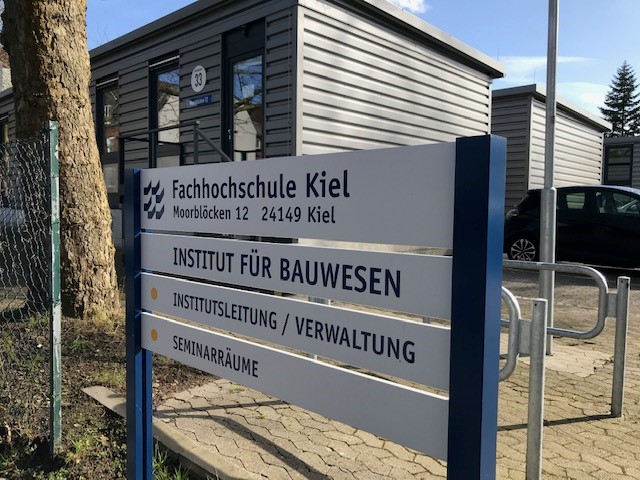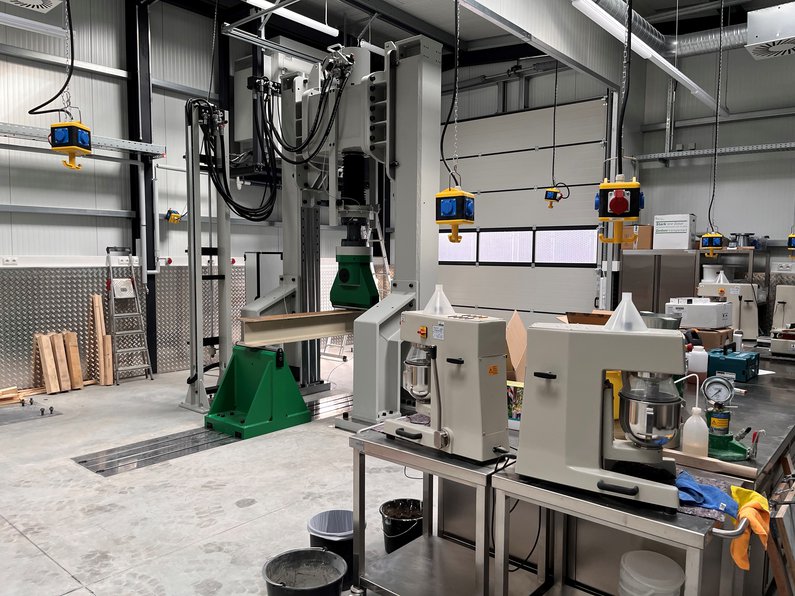Laboratory for Building Materials and Structure Diagnostics
Buildings C35 and F10
Head of Laboratory
Prof. Dr.-Ing. Kenji Reichling
Certified Building Materials Technician
Student Assistants
Niklas Horch
Anna Hagensen
Johanna Nowak
Expertise
- Building Materials
- Material Testing
- Construction Diagnostics
- Non-Destructive Testing (NDT)
- Structural Health Monitoring
Services
- Mechanical Testing of Material Properties
- Non-Destructive (NDT) and Minimal Invasive Testing of Structures and Materials
- Development and Testing of NDT-Methods
Equipment for the Testing of Building Materials
- Hydraulich Testing System for determining mechanical parameters consiting of:
- Compressive strength test frame 5000 kN, e.g. for concrete, wood, bricks
- Flexural strength test frame 300 kN, e.g. for concrete, fibre reinforced concrete as 3- or 4-point bending test
- Combined compressive and flexural strength test frame (300kN, 10 kN), e.g.for cement, mortar and gypsum test samples as well as lightweight and aerated concrete
- Equipment for determining the Young´s Modulus and the indirect tensile strength (splitting) of concrete
- Water Impermeability testing setup, e.g. for concrete
- Wet Concrete and Mortar testing (e.g. flow consistency, air entrainment meter, Hägermann-Flow Table)
- Cement Testing (e.g. Vicat, Le Chatelier, Blaine)
- Paddle Mixers for Concrete and Mortar Mixers
- Specimen Storage
- Humidity cabinet, e.g. for mortar specimens
- Temperature controlled water storage for concrete and mortar specimens
- Drying cabinet, e.g. for small sized specimens and testing materials
- Climate chamber with CO2 control for carbonation tests, e.g. on cementitious materials
- Ultrasonic Device for determining the dynamic modulus, e.g. of concrete
- RCM Device (Rapid Chloride Migration): Determination of the chloride migration coefficient on concrete drill cores
- Potentiostats for electrochemical (corrosion) tests
Equipment for Structure Diagnostics
- Potential Mapping: minimal-invasive localisation of areas with a high corrosion risk on reinforced concrete structures
- Resistivity Meter: non-destructively on the structure or destructively in the laboratory (e.g. drill core)
- Cover Meters: non-destructive localisation of reinforcement bars, determination of concrete cover depths and minimal-invasive determination of rebar diameters in concrete structures
- Radar Scanners: non-destructive localisation of reinforcement bars or installations or determination of structure dimensions
- Ultrasound Scanners, Impact-Echo: e.g. non-destructive determination of structure dimensions and localisation of hollow areas by pulse transmission or echo
- Microwave and Capacitive Sensors: non-destructive determination of moisture in poreous building materials
- Rebound Hammer: non-destructive or minimal-invasive determination of concrete compressive strength at the structure (R- and Q-Values)
- Tear off Test Device: for determining the surface tensile strength or adhesive pull strength
- Torrent Permeability Tester: non-destructive determination of the gas-permeability of concrete
- Bore Dust Extraction Device: e.g. for extracting concrete samples in order to determine the chloride content
- Concrete Core Drill
- Crack Monitoring: electronic or analog recording of crack widths. Also crack magnifier, scales, etc.
- Endoscope: e.g. for assessing hollow areas and bore holes
- Climate Sensors: e.g. air and structure temperature, rel. air humidity
Directions
- Laboratory "Campus"
Building C35
Grenzstr. 19
24149 Kiel
Directions Campus
- Laboratory "Seefischmarkt"
Building 10a (F10)
Wischhofstr. 1-3
24148 Kiel
Directions Seefischmarkt
- Office (Campus)
Building C34
Moorblöcken 12
24149 Kiel
- Mail and Package Delivery (Campus)
Kiel University of Applied Sciences
Faculty of Media and Civil Engineering
Laboratory for Building Materials and Structure Diagnostics
Grenzstr. 3
24149 Kiel


